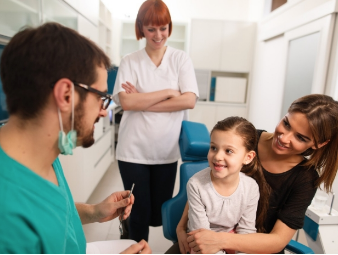
Cavities are the most common chronic childhood disease. Over the past two decades, reports and policies have called for pediatric primary care providers to incorporate oral health into their well visits, including screening and referring children to dentists. Despite these efforts, many primary care providers are not integrating oral health into patient visits, and some report feeling unprepared or uncomfortable in this role.
To improve interprofessional skills and collaboration between primary care and dental providers, NYU Meyers’ Oral Health Nursing Education and Practice (OHNEP) program–which works to help nurses and other health professionals incorporate oral health into patient care—developed an innovative pediatric oral health clinical experience.
In the interprofessional experience, family nurse practitioner, medical, and dental students work as a team to assess patients. Together they review a patient’s chart, take a patient’s medical and dental history, perform an oral assessment, apply fluoride varnish, and educate children and parents. Students also learn to identify the connection between oral health and overall health—for instance, how certain diseases or medications can affect oral health. The goal is to increase the oral health knowledge and skills of non-dental primary care providers while boosting dental students’ knowledge about the link between oral and systemic health.
“Collaborative, workplace-ready students are valuable assets to any clinical team. Our goal is for team-based, whole person care to become the norm for promoting children’s oral health and preventing cavities,” said Erin Hartnett, DNP, PPCNP-BC, CPNP, director of OHNEP at NYU Meyers and the study’s lead author.
Over three semesters, a total of 162 family nurse practitioner, dental, and medical students participated in this interprofessional experience at a New York City hospital. Students completed surveys before and after their participation to evaluate whether their interprofessional competencies changed.
The researchers found that all students had significantly improved interprofessional competency scores after the team-based experience. This includes improvements in important factors for working with other professionals, such as communication, collaboration, conflict management, team functioning, and using a patient-centered approach.
“Our findings suggest that a team-based, clinical approach can be an effective strategy to help health professional students develop interprofessional competencies,” said Judith Haber, PhD, APRN-BC, FAAN, the Ursula Springer Leadership Professor in Nursing at NYU Meyers, executive director of OHNEP, and the study’s coauthor.
In addition to Hartnett and Haber, study authors include Peter Catapano of Bellevue Hospital Center, NYU School of Medicine, and NYU College of Dentistry; Nancy Dougherty, Amr Moursi, and Courtney Chinn of NYU College of Dentistry; Ramin Kashani of NYU College of Dentistry and Bellevue; Cindy Osman of NYU School of Medicine and Bellevue; and Abigail Bella of NYU Meyers.
The interprofessional experience is part of NYU Meyers’ Teaching Oral-Systemic Health program, funded by the Health Resources and Services Administration (HRSA) (grant #D09HP25019).
About NYU Rory Meyers College of Nursing (@NYUNursing)
NYU Rory Meyers College of Nursing is a global leader in nursing and health. Founded in 1932, the College offers BS, MS, DNP, and PhD degree programs providing the educational foundation to prepare the next generation of nursing leaders and researchers. NYU Meyers has three programs ranked in the top 10 by U.S. News & World Report and is among the top five nursing schools receiving NIH funding, thanks to its research mission and commitment to innovative approaches to healthcare worldwide.





